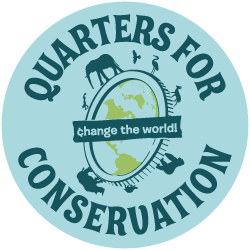
Want to help save wildlife and wild places? By visiting Zoo Atlanta, you already have! Did you know that 25 cents of every Zoo Atlanta general admission ticket benefits field conservation programs?

Want to help save wildlife and wild places? By visiting Zoo Atlanta, you already have! Did you know that 25 cents of every Zoo Atlanta general admission ticket benefits field conservation programs?
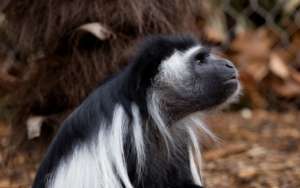 COLOBUS CONSERVATION
COLOBUS CONSERVATIONArea of Influence: Diani Beach, Kenya
What’s the issue?
As part of the Coastal Forests of Eastern Africa Global Biodiversity Hotspot, this area is home to over 500 species of flora and fauna found nowhere else on Earth. Rapid development following the construction of a road through the forest has exposed local wildlife to new threats of habitat fragmentation, increased traffic volumes, and exposed power lines. As a result, the local population of Angolan colobus monkeys has declined.
What your vote will support
Colobus Conservation works in partnership with Kenya Wildlife Services to deliver conservation awareness campaigns, mitigate wildlife traffic accidents, protect wildlife habitat, and provide economic opportunities to local communities. Their work includes building and maintaining “colobridges” that allow wildlife to safely access forest areas on either side of the road; propagating and selling native trees; and providing free conservation education workshops to various community groups.
How YOU can help
Did you know?
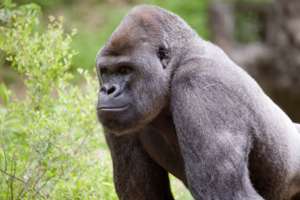 PROJECT GORILLA FERNAN-VAZ (PGFV)
PROJECT GORILLA FERNAN-VAZ (PGFV)Area of Influence: Ogooué-Maritime Province, Omboué, Gabon
What’s the issue?
Wild populations of western lowland gorillas are less than half the size they were 20 years ago. If this trend continues, the species could become extinct in as few as 20 years. A mineral in our phones and tablets, called coltan, is mined in the forests of Africa where gorilla species live. This results in habitat loss which leads to increased incidences of poaching and disease transmission between people and gorillas.
What your vote will support
Project Gorilla Fernan-Vaz (PGFV) aims to save gorillas while helping people. Their focus on capacity building in the local community includes purchasing locally-grown produce for the rescued gorillas in their care;hiring local people to work at the sanctuary; and training community members to conduct biodiversity surveys. These initiatives provide reliable income so that residents do not need to rely on poaching, while educational community events drive conservation awareness.
How YOU can help
Did you know?
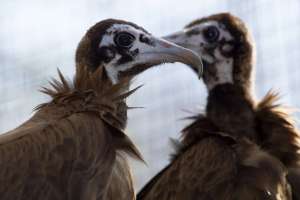 VULPRO
VULPROArea of Influence: Hartbeespoort, South Africa
What’s the issue?
Vultures are essential for breaking down carcasses and cycling nutrients back into the ecosystem, so when their populations decline, the entire ecosystem is at risk. Right now, African vultures are in crisis – most species native to southern Africa face a high risk of extinction in the wild. The most significant threats to vulture populations include poisoning (both accidental and intentional), poaching for the wildlife trade, habitat loss, and collisions with power infrastructure.
What your vote will support
VulPro aims to protect vulture populations through rehabilitating injured birds; bolstering wild populations by releasing birds bred in human care into the wild; and studying vultures to inform conservation planning. They need our help to expand their breeding program to include hooded vultures and lappet-faced vultures – two endangered species that call Zoo Atlanta home.
How YOU can help
Did you know?
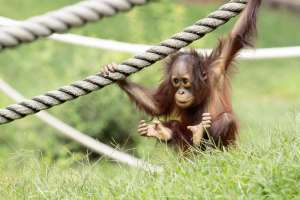 Borneo Orangutan Survival Foundation
Borneo Orangutan Survival Foundation Borneo, Indonesia
Rampant deforestation linked to the global palm oil industry has significantly reduced orangutan habitats over recent decades. As a result, the orangutan population is rapidly declining. These extraordinary apes are considered critically endangered and could become extinct in the wild within the next 20 years.
The Borneo Orangutan Survival Foundation (BOSF) works to maintain, restore, and protect the forests that provide a home to orangutans and many other animals. BOSF also rehabilitates orangutans to be reintroduced to the wild and works to educate local communities on how they can support wildlife.
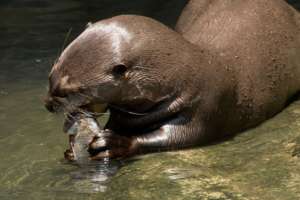 Save the Giants
Save the Giants Guyana, South America
Giant otters are poorly studied in their native range, resulting in unknown population trends and under-representation in conservation work. Primary threats to this endangered species include habitat loss and fragmentation related to the agricultural fishing industry; the illegal wildlife trade; lack of law enforcement; and changes in the environment.
Save the Giants (STG) works to advance giant otter conservation by involving the local Guyanese community in otter population surveys to generate the information needed to make land management decisions. STG also provides training in best practices for sustainable, low impact eco-tourism to create employment opportunities for local people.
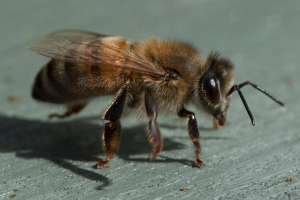 Xerces Society of Invertebrate Conservation: Pollinator Conservation Program
Xerces Society of Invertebrate Conservation: Pollinator Conservation Program United States
Pollinators provide an essential ecological service necessary for the reproduction of over 85% of the world’s flowering plant species, including many crops that support the global food supply. Most of this pollination is provided by insects like bees, butterflies, wasps, flies, and beetles. In many places, pollinator populations are declining due to habitat loss, pesticide use, and disease.
The Xerces Society’s Pollinator Conservation Program works to restore and expand pollinator habitat by advancing sustainable crop production practices and providing region-specific educational resources for individuals and communities dedicated to protecting pollinators.
What’s the issue?
With only 400 blue-throated macaws left in the wild, immediate conservation action is critical for this species. Threats to these charismatic birds include habitat loss, lack of viable nesting sites and illegal pet trade. Asociacion Armonia has established Barba Azul Nature Reserve, the world’s first protected habitat for the macaw in northern Bolivia.
What your vote will support
Preserving this critically endangered ecosystem not only protects the blue- throated macaw, but also neighboring species like jaguars, pumas and maned wolves. The association’s community-centered approach works to educate and engage local people in protecting macaws from poaching, rather than exploiting the birds in the illegal pet trade and decorative feather trade.
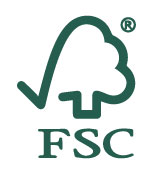
How YOU can help
What’s the issue?
Their threats include habitat loss, habitat degradation as a result of growing human populations, and illegal hunting. Even though some giraffe subspecies are considered to be among some of the planet’s most threatened large mammals, the Giraffe Conservation Foundation is the only organization in the world that concentrates solely on the conservation and management of giraffes in the wild. The foundation works closely with local governments and other partners to preserve giraffe populations and facilitate education programs across Africa.
What your vote will support
The Giraffe Conservation Foundation works closely with local governments and other partners to preserve giraffe populations and facilitate education programs across Africa.
How YOU can help
What’s the issue?
Once one of the most abundant tortoise species in the world, the radiated tortoise could face extinction in the next 10 to 20 years. In Madagascar, slash-and-burn agriculture and mining have diminished habitat for this now critically endangered tortoise. Additionally, an estimated 200,000 radiated tortoises are poached from the wild annually for the illegal pet trade and meat.
What your vote will support
In 2018, unprecedented confiscations of over 18,000 radiated tortoises were rescued and are cared for by the Turtle Survival Alliance. The Radiated Tortoise Reintroduction Project’s goal is to reintroduce these poached tortoises back into the wild into safe and suitable habitats with the support and involvement of local people.
How YOU can help
What’s the issue?
On the brink of extinction in the 1980s, the endangered drill monkey faces threats from habitat loss and poaching for the bushmeat trade. In Nigeria, farming and illegal logging have claimed more than 95 percent of drills’ rainforest habitat.
What your vote will support
Thanks to rescue and rehabilitation efforts and managed breeding programs, the Pandrillus Foundation’s Drill Ranch is now home to more than 500 drills, with a goal of releasing these shy but social animals back into the wild. The Drill Ranch also assists the surrounding community by providing livelihoods, training and healthcare for local people and by donating tree seedlings and education materials to area schools.

How YOU can help
What’s the issue?
The African lion population has decreased by over 40 percent in just the last 20 years, and lions now occupy only 17 percent of their historical habitat. Lions face threats from habitat loss and illegal hunting and are frequently killed for preying on livestock.
What your vote will support
The Lion Guardians program employs young Maasai warriors, who once viewed lion killing as a rite of passage, to become lion protectors by training them on methods to help their communities coexist with lions. Lion Guardians also monitors lion populations via radio-tracking and works to lion-proof livestock pens. Their efforts prevent an average of 50 lion hunts a year and lessen the economic cost of livestock loss to local farmers.
How YOU can help
What’s the issue?
Roughly 80 percent of the fossa’s forest habitat in Madagascar has been destroyed for slash-and-burn agriculture, mostly for cattle farming, and for charcoal production and timber harvest. Now classified as vulnerable, fossas are the largest native predators on Madagascar. Habitat loss and habitat fragmentation have resulted in a population decline of around 30 percent for these solitary animals, which require continuous territories to find food and mates.
What your vote will support
The Rainforest Trust is establishing a 3,460-acre Lost Rainforest Reserve to create a safe habitat for fossas and the many other species found only on Madagascar. The reserve will employ local people, provide education to surrounding communities, and establish firebreaks to prevent the spread of forest fires to protected areas.
How YOU can help
What’s the issue?
With fewer than 500 Sumatran tigers left in the wild, protecting them and their habitat is necessary for their survival. Sumatran tigers are facing serious threats as a result of habitat loss from human encroachment and unsustainable palm oil plantations poaching for their fur and bones, and killing by humans when they enter villages and prey on livestock.
What your vote will support
Your vote will help the Tiger Conservation Campaign work to combat these threats. The project prevents human/tiger conflict by constructing tiger-proof livestock pens in villages, increasing outreach and awareness, and helping local veterinarians respond with assistance for wild tigers caught in snares.
How YOU can help
What’s the issue?
The populations of seven African vulture species have declined by over 80 percent in just the last few decades, having a dramatic effect on their ecosystem. Vultures are Africa’s unsung heroes. As scavengers, they are a vital part of all healthy ecosystems. They are nature’s hazmat team, eating animal carcasses that, when left untouched, become breeding grounds for disease. One of the biggest threats to vultures is poisoning, both accidental and intentional. Vultures may be accidentally poisoned by eating the carcass of a poisoned animal, a common method used by poachers. They may also be intentionally poisoned by poachers, who target them because their presence can alert authorities to poachers’ locations.
What your vote will support
Your vote will help provide the necessary resources and training to The Peregrine Fund’s Poison Rapid Response Team. This team is the “911” for vultures in east Africa. The Poison Rapid Response Team quickly locates, saves, rehabs, and then releases these amazing birds!
How YOU can help
What’s the issue?
Bush dog populations are dramatically declining as a result of human-driven factors, with habitat loss being the greatest threat. The cutting of the native forest for plantations and agriculture has led to an increase of non-native plants, and bush dogs and other endangered species from the region face a decline in available food and serious habitat fragmentation.
What your vote will support
Your vote will help Project Bush Dog to establish protected areas of continuous habitat, called biological corridors, to connect fragmented habitats and minimize human-wildlife conflict. Specifically, Project Bush Dog will use trained detection dogs to sniff out and locate bush dog feces, which tell us where they live. With this field research, the project will be able to form this biological corridor, with the potential to save bush dogs as well as other endangered species in the region.
How YOU can help
Want to know more about how the Zoo’s conservation efforts protect wildlife and wild places? Learn more about other conservation programs at Zoo Atlanta.
Golden lion tamarins are a flagship species in Brazil’s Atlantic Coastal Forest, but only two percent of their original habitat remains. When the Golden Lion Tamarin Association began its work, habitat loss and the illegal pet trade had reduced wild populations to only around 200 individuals.
Their numbers are now estimated to be about 3,200, but there’s still much work to be done to protect their forest for all who need it, including humans.
Visit our golden lion tamarins in the KIDZone and learn more about the Golden Lion Tamarin Association.
Elephants for Africa works to protect Earth’s largest land mammals from habitat loss, ivory poaching and the growing conflict between elephants and farmers. Fewer than 500,000 African elephants remain, and 60 percent of the surviving population relies on land that’s currently unprotected.
The project seeks to educate and inspire the people of Botswana to live in harmony with elephants who share their land and natural resources.
Visit our African elephants in the Zoo’s African Savanna, and learn more about Elephants for Africa.
Revered for centuries as a symbol of good luck but now believed to be extinct in the wild, the Panamanian golden frog has vanished from its native habitat as a result of the amphibian chytrid fungus, habitat loss and the illegal pet trade.
Project Golden Frog works in the wild and in zoos to ensure the species’ survival through captive breeding, with the ultimate goal of restoring these icons to the wild.
Visit our Panamanian golden frogs in Scaly Slimy Spectacular: The Amphibian and Reptile Experience and learn more about Project Golden Frog.